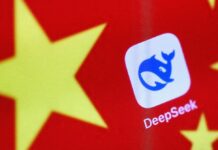It signals that lawmakers see tech regulation as an issue that could curry political support in a heated election year.
Much of the chatter about breaking up Big Tech has died down on the campaign trail in the months since Sen. Elizabeth Warren (D-Mass.) dropped out of the race. And tech policy issues have largely been absent from high-profile political events in recent weeks, including at this week’s Democratic convention. But the fundraising blitz is a sign it could bubble up again — even in down-ballot races.
Democrats’ emails focused on their commitment to follow through on the antitrust investigation into big companies.
“I won’t back down from this fight,” wrote Rep. David N. Cicilline (R.I.), the Democrat leading the House investigation into major tech companies. “Will you make a contribution today to support our work to hold Big Tech accountable?”
Cicilline’s email highlighted an exchange in the July hearing with Amazon chief executive Jeff Bezos about feedback the committee collected from third-party sellers using the e-commerce platform. One seller, Cicilline said in the clip, compared Amazon to heroin, because they felt like they had to keep returning to the platform even though they knew it would be their downfall. (Bezos owns The Washington Post.)
Cicilline in the email also accused all the companies of not properly answering the committee’s questions. “This is unacceptable behavior from an industry that completely dominates our way of life,” Cicilline wrote. His office did not immediately respond to a request for comment.
Meanwhile, Rep. Hank Johnson (D-Ga.)’s fundraising email focused on his questions for Apple chief executive Tim Cook about Apple’s App Store policies, which have been criticized as anti-competitive. He also questioned Bezos on the spread of counterfeit products on its online marketplace and pressed Facebook’s Mark Zuckerberg about the company’s practices, his fundraising note said.
“Hank, like others in Congress, is proud to rely upon his online small donor fundraising operation, which supports his career-long fight for the little guy — consumers, working people, and small business owners — by holding the powerful accountable and protecting consumer privacy,” his office said in a statement.
Meanwhile, a Republican focused on claims that the companies are biased against conservatives.
Rep. Matt Gaetz (R-Fla.) focused his email on accusations that tech companies are “shadowbanning,” or limiting the content, of conservatives. (The companies have repeatedly denied doing this.) He also linked to a Fox News interview where he made these claims.
“Unfortunately, Big Tech has bought off most of Congress and will continue to go unchecked if we don’t take a stand,” he wrote. “That’s why I’m asking you to DONATE TODAY, even just $5 or $10, so that I can join President Trump in taking on these tyrants.” Gaetz’s office did not immediately respond to a request for comment.
Gaetz’s email highlighted how both parties are attacking major tech companies – but in very different ways.
Democrats have largely kept the spotlight on what they see as corporate power and greed, as well as issues that they say could harm consumers. For instance, the party said in its 2020 platform that it plans to update Obama-era privacy policies and work with Congress to pass them.
Republicans, including Trump, have meanwhile kept the spotlight on their claims that tech companies – mostly located in largely liberal enclaves such as California and Washington state – are silencing them. However they’ve presented scant evidence to support such claims, and conservatives continue to build strong followings on social networks including Facebook and Trump’s favored bully pulpit, Twitter.
Tech companies in recent weeks have tightened their misinformation policies related to voting, which could lead to more moderation actions against politicians’ posts and potentially reignite these accusations in the months and weeks before the election.
Tech industry groups say the fundraising signals that the investigation has become overly politicized.
Carl Szabo, the vice president and general counsel of NetChoice, said the emails suggest lawmakers are more interested in grandstanding and fundraising than finding facts.
“Is anyone surprised? No of course not,” Szabo said in an interview. “This was not a fact-finding hearing. This was an opportunity to grandstand and fundraise. And now you’re seeing exactly that.”
Rant and rave
Democrats marked night two of their unprecedented virtual convention with animated fireworks, a reimagined roll call and Zoom conference-style applause. Here are some highlights:
Twitter users dug the “Eurovision” vibes of the live delegate roll call. The New York Times’s Caity Weaver:
There were a few clear favorites, especially Rhode Island, which used its 15 seconds of fame as a calamari commercial:
Our top tabs
Coronavirus misinformation is viewed more than content from trusted health officials on Facebook, researchers say.
Misinformation about coronavirus vaccines and other health topics have been viewed an estimated 3.8 billion times, or four times as much as content from resources such as the World Health Organization, according to a study by the left-leaning global human rights group Avaaz, Elizabeth Dwoskin reports.
The group found that some pages peaked in traffic even as Facebook cracked down on removing dangerous coronavirus-related misinformation. Facebook’s labeling of posts indicated by third-party fact-checkers as misleading was also inconsistent. Avaaz found that 84 percent of the posts it reviewed had no warning label from fact-checkers.
The report was based on Facebook’s own reporting metric, adding “fuel to critics’ arguments that major technology companies cannot control the spread of harmful misinformation on their platforms, and in many cases amplify it,” Elizabeth writes.
“We share Avaaz’s goal of limiting misinformation, but their findings don’t reflect the steps we’ve taken to keep it from spreading on our services. Thanks to our global network of fact-checkers, from April to June, we applied warning labels to 98 million pieces of covid-19 misinformation and removed 7 million pieces of content that could lead to imminent harm. We’ve directed over 2 billion people to resources from health authorities and when someone tries to share a link about covid-19, we show them a pop-up to connect them with credible health information,” said Facebook spokesman Andy Stone.
A judge could rule today on Uber’s future in California.
The company could shut down its services Friday at midnight in the state if a judge doesn’t grant it and competitor Lyft a reprieve from a decision last week that would force them to classify workers as employees, Faiz Siddiqui reports.
The company, which is exploring its options if its appeals fall flat in court, says it is considering a franchise model where independent franchisees would oversee employees — similar to the traditional taxi model. Lyft also said it has explored how to make employment work, but company officials did not go into specifics.
Critics say the company has had more than enough time since the state enacted its worker classification law in January to make changes. They say Uber is simply trying to run out the clock until November, when California voters will vote on a ballot initiative that could overturn the law.
Some drivers who have advocated for employee benefits also expressed frustrations.
“We have millionaires who are choosing — not forcing — but are choosing to lay off ordinary people in the middle of a pandemic because they choose not to follow the law,” said Cherri Murphy, 53, an Oakland, Calif., resident who drives for Lyft full time. “This is not a surprise to anybody. They’ve had an extended amount of time to resolve this. The only people who put themselves against the wall have been Lyft and Uber.”
A final Senate Intelligence report shows that the Trump campaign embraced WikiLeaks materials.
President Trump spoke with associate Roger Stone about WikiLeaks on “multiple occasions,” despite the fact that the president said he did not recall doing so, the report found, according to my colleagues Greg Miller, Karoun Demirjian and Ellen Nakashima.
“While the GRU and WikiLeaks were releasing hacked documents, the Trump Campaign sought to maximize the impact of those materials to aid Trump’s electoral prospects,” the final report by the committee looking into the 2016 election concluded.
The report also notes several shuffles in Trump’s campaign staffing that left it vulnerable to espionage. “Russian officials, intelligence services, and others” acting in concert with the Kremlin “were capable of exploiting the transition team’s shortcomings,” the report concluded. “Based on the available information, it is possible — and even likely — that they did so.”
Partisan reactions to the report indicate that the conclusion to the years-long investigation is unlikely to defuse political fights over how to treat foreign interference ahead of the upcoming election. Sen. Kamala D. Harris (D-Calif.), the vice-presidential nominee, and four other Democratic senators asserted that the report “unambiguously shows that members of the Trump Campaign cooperated with Russian efforts to get Trump elected.”
“After more than three years of investigation by this Committee, we can now say with no doubt, there was no collusion,” a group of six panel Republicans, including acting Senate Intelligence Committee chairman Marco Rubio (R-Fla.), wrote in a statement that instead accused the Democratic Party of coordinating with foreign actors.
Trump tracker
Trump once again blamed the U.S. Postal Service’s problems on Amazon.
His tweet Tuesday echoed former criticisms that Amazon should have to pay more for services provided by the U.S. Postal Service. Trump previously pressured the U.S. postmaster to more than double its rates for Amazon.
Inside the industry
The Electronic Frontier Foundation and other privacy groups urge California to adopt privacy guardrails for coronavirus tracing apps.
The groups are calling for a ban on the use of data collected for coronavirus tracing for targeted advertising or other commercial purposes. The group also advocates that data be purged after 30 days.
“Doing so will also help ensure greater success for these contact tracing programs as more Californians will feel safe participating in them knowing the information they provide to help fight the pandemic won’t be used to deport them or build data-rich profiles for data brokers and advertisers,” the Electronic Frontier Foundation, the American Civil Liberties Union of California, Privacy Rights Clearinghouse, Media Alliance and Oakland Privacy wrote in a letter to the California governor and state legislators.
The groups cited how privacy concerns with apps in other states such as Utah deterred participation. The groups say they support two bills by legislators that already support these protections and are working to get them passed.
Trending
Bookmark this
Before you log off
The first official Zoom nomination








